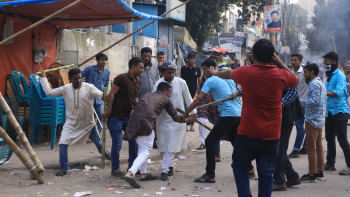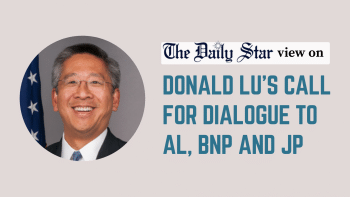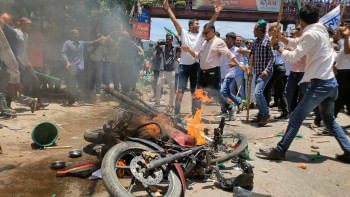Reading Donald Lu’s letter, intently

US Assistant Secretary of State Donald Lu's letter, calling on Bangladesh's three main political parties to have a dialogue, is not as simple as it sounds. It demands our attention for two reasons: the timing of the letter and the possibility of the request coming to fruition.
As for the timing, the letter was issued after a meeting of foreign and defence ministers of the US and India in New Delhi. In the meeting, India raised the issue of Bangladesh's election and conveyed its position "clearly." According to media reports, the US has not responded. Usually, in bilateral diplomatic meetings, many issues are discussed between the two sides. The issues on which the parties agree are made public through a readout or a joint statement, while both sides remain silent on unresolved issues. This is the usual, unwritten diplomatic practice; one can term this a diplomatic norm.
However, after the New Delhi meeting, Indian Foreign Secretary Vinay Kwatra told reporters that the issue was discussed in detail and India had conveyed its position. The absence of Bangladesh in the published readout means that there has not been an agreement—or in other words, the US did not agree with the Indian position. This raises the question of what the United States would do, considering that it has been insisting on an inclusive election and has adopted various measures to "lend… support to all those seeking to advance democracy in Bangladesh." The timing of Donald Lu's letter conveys the message that the US has remained active in pursuing its policy. As such, one can wonder: is this a message for India, too? Is there a connection between India's clarification of its policy and Lu's letter?
Let's look at the content of the letter. It urges, as US Ambassador to Bangladesh Peter Haas said a few days ago, to hold unconditional dialogue and find a solution to the impasse. Somehow, the letter was sent to BNP, and BNP has acknowledged its receipt. I say "somehow" because, evidently, it was not delivered to the party's central office. It may be recalled that a letter sent by the Election Commission to BNP, inviting the party to a dialogue, was left at the door of the BNP office as it was locked and under complete control of law enforcement agencies. Although BNP has always said that it is ready to hold talks, it has also said that the talks will only take place after the Sheikh Hasina government resigns. This is viewed as a condition, but it can also be called the agenda of a dialogue.
As a new situation has emerged, hypothetically speaking, if BNP wants to hold talks unconditionally, then the decision to do so will have to be made by its top leaders through discussions among themselves and by securing the nod of the acting chair of the party. As we are aware, those who can make such decisions—that is, top-ranking BNP leaders, including the secretary general of the party, Mirza Fakhrul Islam Alamgir—have remained arrested since October 28 on various charges, some of which are outrageous and fictitious at best. They have been denied bail and are languishing in jail. Who then will make this decision? Who will represent BNP?
Donald Lu is not the first person to suggest that the way out is a dialogue. However, with the weight of the US behind the letter, it should give pause to the ruling party and the government. AL needs to prove that the rhetoric has substance. Otherwise, it will strengthen the argument that AL is not willing to have a fair election.
If the ruling party says it is ready to talk, as Foreign Minister AK Abdul Momen indicated on Tuesday, the question is—to borrow his words—"with whom?" This question arises not because there is nobody to be represented, but because the government has arrested these leaders and clamped down on all opposition activists. If the government is true to its word, or at least tries to be seen as interested, the first thing it has to do is to release the detained BNP leaders immediately and to end the detentions and persecution that are taking place across the country. Donald Lu's letter puts this responsibility on the government, fairly and squarely. It is not enough for the Awami League to say "we want dialogue," or "if there is necessity for dialogue to keep the democratic journey uninterrupted, we will do that." These are empty talks, vocal callisthenics of some kind. The ruling party knows, as does the entire country, that Donald Lu is not the first person to suggest that the way out is a dialogue. However, with the weight of the US behind the letter, it should give pause to the ruling party and the government. AL needs to prove that the rhetoric has substance. Otherwise, it will strengthen the argument that AL is not willing to have a fair election.
The behaviour of the ruling party in recent months—especially the desperate moves to split BNP, flip disgruntled BNP leaders, pressure local and national leaders using state apparatuses to join the election, and create several King's parties—indicates that AL is more inclined to have an engineered show than an election, as it did in 2014 and 2018. The clampdown, the belligerent rhetoric, the aggressive posture of the party leaders along with the dispensation of largesse to those who would conduct the election show that the AL is far from agreeable to a solution. This is what "undermining the democratic election process" looks like. The reminder of the US visa policy (commonly referred to as 3Cs) in Donald Lu's letter should not simply be ignored.
The United States insists on "unconditional dialogue." Prime Minister Sheikh Hasina, as a response to Ambassador Haas' suggestion, has already offered a condition: she will sit with the opposition only if President Joe Biden sits with Donald Trump; otherwise, she won't negotiate. Supporters of the ruling party would say that BNP has already put forward a condition that they will not sit for talks without the resignation of the prime minister. Putting aside these conditions—which Lu's letter decided to ignore—there are no objections to the suggestion that a dialogue needs to have an agenda. In fact, no dialogue can be held without a clear agenda.
Bangladesh's history is replete with instances of such dialogues ending with no results. What can be the agenda in the current situation? Since the current system does not allow for an inclusive, acceptable election, and as a level playing field is not only absent but deliberately being tilted over the years through constitutional and extra-constitutional measures, the agenda of any dialogue must be to find out what new arrangements can be made so that everyone can participate. This means the participation of not only political parties, but of the key stakeholders: the voters. How a guaranteed mechanism can be created for this end should be the agenda. Is the ruling party willing to go for a dialogue to address this? In large measure, their behaviour will determine what kind of role the United States will play in the future.
While all these are up in the air, and uncertainty looms, the Election Commission has announced that the 12th parliamentary election will be held on January 7, 2024. Their moves seem to be consistent with the wishes of the government. When opposition parties are facing severe persecution, the election commissioners seem to be living in a make-believe world. The statement of the EC secretary that "the country's environment is favourable for announcing the schedule for the 12th parliamentary election" is testimony to their obliviousness to reality. The comment that the letter won't affect the election schedule is mind-boggling. Perhaps the EC should try to understand the essence of the letter as much as heed the calls of political parties that an agreement has to be reached before declaring the election schedule. Perhaps, the letter has a message for the EC, too.
Having learnt of the content of Donald Lu's letter, we must ask the US administration: if the parties flout the suggestion and the government does not take the initiative, what measures is the US willing to take to extend "support to all those seeking to advance democracy in Bangladesh"? The US measures—for example, the sanctions on Rab and its officers in December 2021 and the visa policy in May 2023—have impacted but evidently have not deterred the government from a full-scale clampdown, as it heads on full steam to hold an election without any consensus on who would be in charge of it. The US' visa policy has been "potentially punitive," but hoping that these actions from the US will be enough to steer the ruling party towards an inclusive election does not seem too realistic. Neither the visa policy nor the call to hold a dialogue will ensure a free election—which is the first step to saving the country from turning into a one-party state. Expectedly, the US policymakers have thought about this, and perhaps there are other tools in their kit. Which ones are to be used, if any, is a question that Bangladeshis and observers of Bangladeshi politics are pondering.
Ali Riaz is distinguished professor of political science at Illinois State University in the US, non-resident senior fellow of the Atlantic Council, and president of the American Institute of Bangladesh Studies (AIBS). His forthcoming book is titled Pathways of autocratization: The tumultuous journey of Bangladeshi politics.
Views expressed in this article are the author's own.
Follow The Daily Star Opinion on Facebook for the latest opinions, commentaries and analyses by experts and professionals. To contribute your article or letter to The Daily Star Opinion, see our guidelines for submission.

 For all latest news, follow The Daily Star's Google News channel.
For all latest news, follow The Daily Star's Google News channel. 











Comments